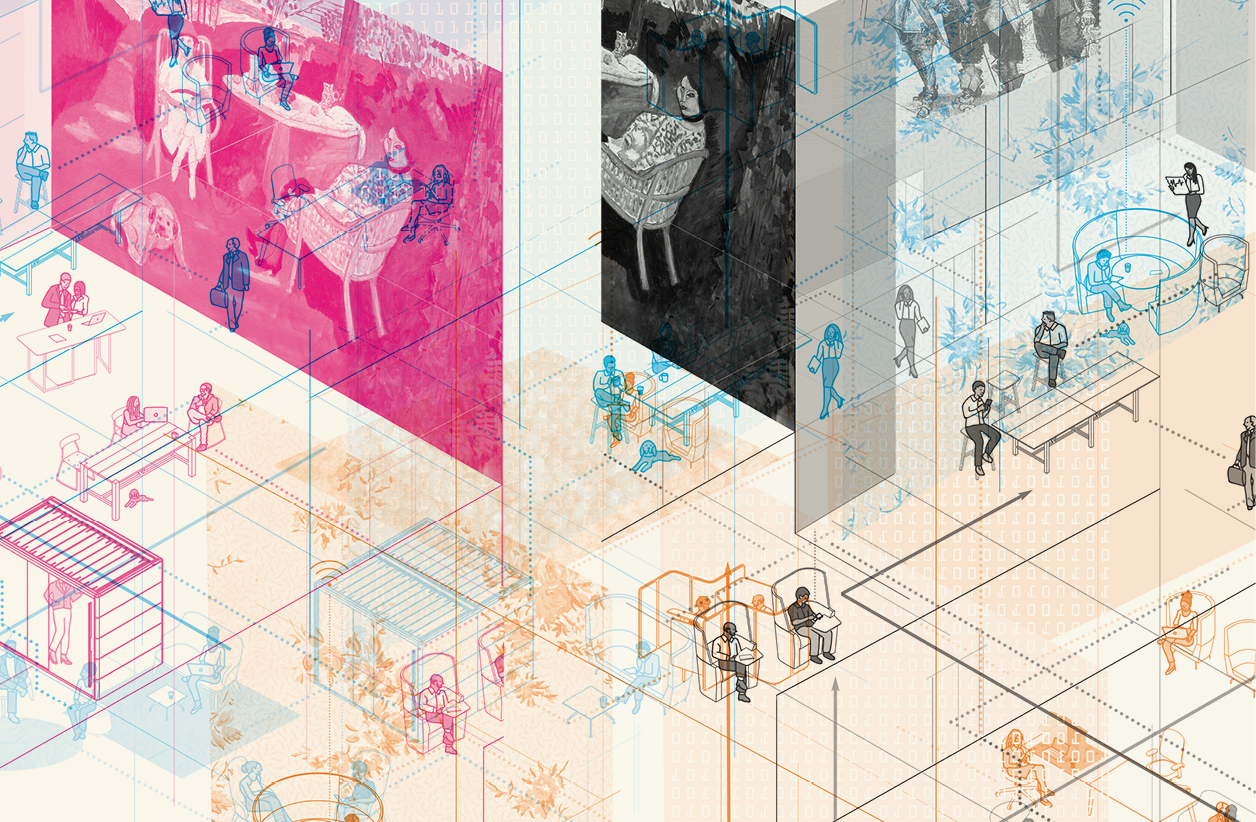8 reasons why homeworking will be a new part of our workday and not our new workday.
Why we will return to the workplace with renewed vitality, and why Smartworking collaborative workspaces will become a more vibrant proposition post Covid-19.

1. Data-driven analytics
Before Covid-19, we were at the beginning of a game-changing shift in the way organisations were designing and utilising their workspaces. This is only going to gather pace post-vaccine.
At Orangebox, our products have always been grounded in research and insight, and inspired by both creativity and our intuitive understanding of the workplace. The rise of data-driven analytics now means we no longer need to second-guess how workspaces are used, space is allocated and collaboration happens.
Smart AI tech will facilitate better space utilisation and collaboration, letting organisations see in real time how their spaces are being used and how and where people are working and collaborating – or not.
Over the next few years, all organisations reeling under the impact of Covid-19 will be searching for savings and for ways to bring new value across their office portfolios.
Orangebox’s Smartworking products are focused on higher value, flexible, collaborative spaces. When configured via the prism of analytics, these spaces will be both more productive and better value than fixed-use spaces. As market leader, we are perfectly positioned to benefit from the new intelligence that AI-driven innovation will bring into workspaces.
2. Working from home yes, but not at the loss of our workplace community
Covid-19 has fast-tracked workforces into working from home, which, for many of us, has proved more productive and less complicated than we could possibly have imagined.
As a result, organisations now understand that enabling workers to be based at home part of the time benefits both the workforce (through an improved work-life balance) and the environment (reducing the number of commutes), while offering significant cost savings to employer and employee alike. Working from home does not, however, offer a long-term full-time solution. It’s clear that collaboration, innovation and bringing new products and services to market suffers while we’re barred from the workplace.
Lockdown will inevitably have loosened the bonds so important to company culture. Rebuilding communal trust and relationships, and inspiring and supporting new ideas and achievements, is something that’s only really going to happen when we’re within the embrace of the collaborative workplace.
3. Shared values, sense of purpose and company culture
If we’re all scattered to the winds, each of us working in isolation, the casual interactions, team dynamics, shared values and common purpose that glue organisations together – building company culture and shared values – will evaporate.
Post-lockdown, all organisations will have an enhanced appreciation for the workspace’s role in knitting together the cultural values and sense of purpose so essential to success (particularly in a recession economy).
Orangebox manufacture and install the furniture that enables this to happen.
4. Connecting people, not furniture
Within many organisations, the accelerated technical innovation of the past decade has led to the demise of the fixed personal workstation and the old, hierarchical office structure. New technologies have created new opportunities, freeing us to work in more enjoyable, creative, collaborative and productive ways, within newly flexible, open-plan workplaces
The contemporary open-plan workplace is, at its best, somewhere it’s a pleasure to spend time in. Offering everything from great coffee to multiple work settings and conducive both to collaboration and to focused work, its benefits were hard won, and will be highly valued after our return from forced exile.
5. The dissipation of immediate action
We now have five months’ experience of remote working, during which time many aspects of our digital tech have proved effective and convenient. However, we’ve also learned that it can take multiple online meetings to solve one relatively simple problem, while critical or urgent issues that require the help of a colleague just aren’t as easily addressed via Zoom.
Within the collaborative workplace we’re used to the immediacy and convenience of having our colleagues nearby. If a question arises during a meeting, it’s quick and easy to pop out and check things with a colleague; if an issue needs resolving, it’s the work of moments to gather a few colleagues together for a quick discussion or brainstorm.
Working from home has given us a new appreciation for this immediacy; and for the efficacy of human-to-human interaction, and Orangebox produces the tools that facilitate this.
6. The workplace is a regulated environment
As a manufacturer, we are required to only bring products to market after conducting in-depth research and undertaking extensive development and testing to ensure they comply fully with all relevant DSE regulations. Many decades of experience, finetuning, improving and evolving have led to the recognition of refined employee wellbeing as an essential element of workplace best practice.
With workplaces closing so abruptly, there wasn’t really time to ensure that our scattered workforces were set up to work from home properly and safely. Smart Home-Working aims to bring our ergonomic and wellbeing acumen from the workplace into the home. And with homeworking here for the long term, there’s no escaping the need for the authoritative Orangebox furniture and accessories to support each homeworker’s wellbeing during their working day.
7. We now understand the true value of face to face
As occupancy levels within the workplace start to rise again, those returning are bringing with them a renewed understanding of the value of meeting with colleagues face to face. While digital meetings have been a godsend in maintaining organisations in the short-term – and will enable a new balance in our work/life in the longer term – the last six months have shown us of the advantages of human-to-human over digital communication.
We now understand that communicating digitally makes it hard to read the nuances in our colleagues’ facial expressions or see the clues suggested by their body movements and gestures. Without the intuitive intelligence gathering that goes on in the room, people become difficult to read, with meetings becoming trickier as a result. The six months we’ve spent communicating digitally have highlighted the benefits we get from meeting face to face; benefits we previously took for granted. And then there’s all the relationship and team building, collaboration and information sharing that happens at the margins. All of which are fundamental components of mentorship and the face to face guidance that’s central to new generations progress within all organisations.
The ease with which we adapted to on-screen meetings means they’re inevitably going to play a bigger role in future. But many of us have come to think of digital meetings as a bit like fast food: convenient and ok for a quick fix, but not good for our health and wellbeing in the long run.
The insights and new values we’re bringing back into the workplace in the wake of Covid-19 are an opportunity for Orangebox to reinvigorate our clients’ organisations, placing a new mix of workplace typologies and innovative products at the heart of Smartworking environments.
8. We can bounce back better with a renewed sense of purpose and a new energy in how we deal with climate change
Since the global lockdown aimed at containing Covid-19, businesses and their employees have had to rapidly adopt new ways of working, new technologies and a new mindset. The changes forced on us as a result of this unique situation, which required millions of us to adapt to working from home almost overnight, has led to an almost universal refrain of, ‘We have achieved in three weeks what would previously have taken three years!’
Being forced into making rapid-fire decisions during this crisis has given us greater confidence in our ability to drive change; things we’d have hesitated to attempt pre-January 2020 will no longer seem so daunting when we return to our workplaces.
Success in business has a tendency to breed bureaucracy, adding time and complexity to decision making, and putting roadblocks in the way of change. The fallout from this pandemic has been a realisation that we have to be more agile and better at thinking on our feet. We have to make bolder decisions quicker and develop the processes to realise them expediently.
The growing international belief that the development, manufacture and distribution of an effective vaccine for Covid-19 can be achieved in a fraction of the time taken for previous vaccines reflects this step change.
The experience of 2020 is something there’s no going back from… We are enabled to have a new clarity of purpose about what we do, how we do it and how it benefits everyone and the environment. Orangebox manufactures products that enable positive change.
Based in Wales, UK, Orangebox design and manufacture innovative office furniture. The company focuses on continuous research and innovations in business to understand the world of work, wherever it happens. This gives them the insight to create products and solutions tailored to clients work needs.
Established in 1998, the company began designing task seating, but has quickly expanded to offer “Smartworking Solutions”- high-performance, well designed furniture that enables people to work in more collaborative and effective ways.
For more information, visit www.orangebox.com
